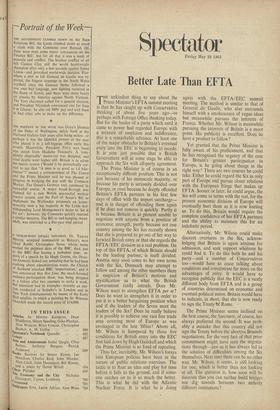Better Late Than EFTA
Trir HE unkindest thing to say about the Prime Minister's EFTA summit meeting is that he has caught up with Conservative thinking of about five years ago--or perhaps with Foreign Office thinking today. But for the leader of a party which until it came to power had regarded Europe with a mixture of suspicion and indifference, this is a remarkable advance. At least one of the major obstacles to Britain's eventual entry into the EEC is beginning to recede. It is now just possible that a British Government will at some stage be able to approach the Six with all-party agreement.
The Prime Minister is of course in an exceptionally difficult position. This is not just because of his minuscule majority, or because his party is seriously divided over Europe, or even because he deeply offended Britain's EFTA partners in his first few days of office with the import surcharge— and is in danger of offending them again if he does not remove it quickly. Partly it is because Britain is at present unable to negotiate with anyone from a position of economic strength, partly because not one country among the Six has recently shown that she is prepared to go out of her way to forward British entry or that she regards the EFTA/ EEC division as a real problem. On top of this EFTA, of which Britain should be the leading partner, is itself divided. Austria may soon come to her own terms with the Six, Denmark may attempt to follow and among the other members there is suspicion of Britain's motives and mystification as to what the British Government really intends. Does Mr. Wilson want to strengthen EFTA per se? Does he want to strengthen it in order to put it in a better bargaining position when and if the leaders of the Seven meet the leaders of the Six? Does he really believe it is possible to achieve one vast free trade area covering most of Europe as was envisaged in the late 'fifties? Above all, Mr. Wilson is hampered by those five conditions for British entry into the EEC first laid down by Hugh Gaitskell and which the Prime Minister is so fond of repeating.
Thus far, inevitably, Mr. Wilson's forays into European policies have been in the nature of public relations exercises. The tactic is to float an idea and play for time before it falls to the ground, and if some- one catches on to it so much the better. This is what he did -with the Atlantic Nuclear Force. It is what he is doing again with the EFTA/EEC summit meeting. The method is similar to that of General de Gaulle, who also surrounds himself with a smokescreen of vague ideas but meanwhile pursues the interests of France. Whether Mr. Wilson is meanwhile pursuing the interests of Britain is a moot point. His publicity is excellent. Does he have a product to follow?
Yet granted that the Prime Minister is fully aware of his predicament, and that he has recognised the urgency of the case for Britain's greater participation in Europe, is he going about things in the right way? There are two courses he could take. Either he could regard the Six as only part of Europe and pursue closer relations with the European fringe that makes up EFTA. Sooner or later, he could argue, the Six will come to terms with the rest, for the present economic division of Europe will eventually hurt them as it is now hurting us. To do this, Britain would require the complete confidence of her EFTA partners and the ability to maintain this for an indefinite period.
Alternatively, Mr. Wilson could make discreet overtures to the Six, acknow- ledging that Britain is again anxious for admission, and seek support wheitver he could find it. To do this both he and his party—and a number of Conservatives too—would have to cease talking about conditions and concentrate far more on the advantages of entry. It would have to recognise publicly that the EEC is a vastly different body from EFTA and is a group of countries determined on economic and eventual political union. Britain would have to indicate, in short, that she is now ready to sign the Treaty V Rome.
The Prime Minister seems inclined on the first course; the Spectator, of course, has always preferred the second. It was prob- ably a mistake that this country did not sign the Treaty before the abortive Brussels negotiations, for the very fact of that prior commitment might have seen the negotia- tions through—just as it has always led to the solution of difficulties among the Six themselves. Next time there can be no other way. Mr. Wilson, it seems, is still looking for one, which is better than not looking at all. The queqion is, how soon will he discover that you can neither build bridges nor dig tunnels between two entirely different institutions?


































 Previous page
Previous page